MAME is an Auntie that just about every gay wished they had growing up. MAME is the story of an eccentric socialite whose famous motto is “Life is a banquet and most poor sons-of-bitches are starving to death” but finds her madcap Manhattan lifestyle with her wealthy friends turned upside down when she is appointed guardian of her orphaned 10-year-old nephew Patrick.
The play is set around an impossibly tall, sleek staircase that curves through the set, which is transformed as the trendsetting Mame revels through a parade of decades, from the art deco glamour of the 1920’s to the ultra-modern chic of the 1950’s
The play begins in 1928 during the roaring twenties, just before the great stock market crash. This event leaves socialite Mame penniless forcing her to get odd jobs and go to work, something she is clearly not suited to do, in order to survive the depression. During one of her hilarious short stints at a beauty salon, just before she gets fired, Mame meets and later marries Beauregard Jackson Pickett Burnside, a rich Southern aristocrat from a Georgia plantation called Peckerwood. In Georgia, more hilarious antics ensue as Mame, in an “I Love Lucy” sort of way, is some how able to begrudgingly win over his conservative Southern family.
The popularity for the play MAME came on Broadway during the 1960’s from 1966 to 1970 when the play ran for a total of 1,508 performances making star Angela Lansbury a Broadway diva. A subsequent movie with Lucille Ball in 1974 and a very short stage run in 1983 came up short in the opinion of many critics. Productions of MAME are rare because to deliver it on stage requires so many inticate costumes and over 100 people. As such, MAME is probably a play that most have never seen, yet it is an incredibly famous and timeless tale of an iconic Auntie that just about any gay person would adore.
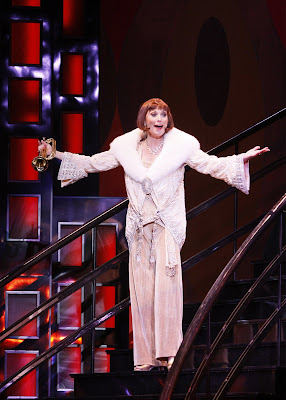 Mame (Dee Hoty) enjoys the banquet of life in The 5th
Mame (Dee Hoty) enjoys the banquet of life in The 5th
Avenue Theatre’s production of Mame. Photo: Chris Bennion.
Expectations were high for actress Dee Hoty as she captures the lead role of MAME exceptionally well. However, her “bosom buddy” Vera Charles, crowned the “world’s greatest lush,” and played by Carol Swarbrick, steals the the spotlight when she is on stage with her comical antics from lively drunk to delirious hangover.
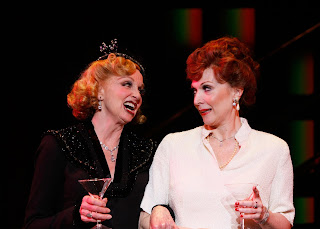 l-r: Vera (Carol Swarbrick) and Mame (Dee Hoty) are “Bosom Buddies”
l-r: Vera (Carol Swarbrick) and Mame (Dee Hoty) are “Bosom Buddies”
in The 5th Avenue Theatre’s production of Mame. Photo: Chris Bennion.
Young Patrick, played by 12-year-old Nick Robinson, offers a believable performance and continues to mature as an actor. Recognizable from several recent productions including ACT’s Christmas Carol and Intiman’s To Kill a Mockingbird his talented singing ability is a highlight of his performance.
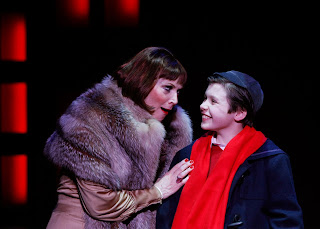 Mame (Dee Hoty) encourages her young nephew
Mame (Dee Hoty) encourages her young nephew
Patrick (Nick Robinson) to “Open a New Window” in The 5th
Avenue Theatre’s production of Mame. Photo: Chris Bennion.
While in Mame’s care, Young Patrick maintains a booklet of naughty words he does not understand but hears from the friends that surround her because Mame does not want to have to explain them to him. Words such as nymphomaniac and lesbian. But Patrick loves his Aunt Mame and she proudly tells her nephew that he will make a girl happy someday. Pulling out his booklet of words he has written down, Patrick describes his idea about relationships with members the opposite-sex as he struggles to pronounce a word he has heard: pla-to-nic.
Throughout her adventure Mame is surrounded by gay characters and many are very flamboyant. But Mame loves to surround herself with interesting and exotic people during her life. An older Patrick explains to his Aunt Mame that he did not want his future in-laws to see her airy-fairy friends from Fire Island. Which probably has an entirely different meaning than what it sounds like now.
The 350 extravagant costumes featured in MAME and designed by Tony Award-winner Gregg Barnes are unbelievable. Also featured is a $30,000 Lalu Yang gown we talked about in a previous post.
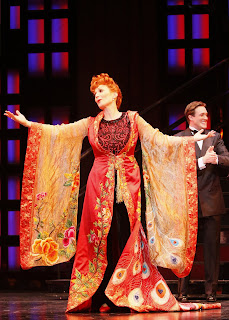 Mame (Dee Hoty, wearing Luly Yang’s $30,000 “Passage to Shanghai”
Mame (Dee Hoty, wearing Luly Yang’s $30,000 “Passage to Shanghai”
gown) and Patrick (Matt Owen) celebrate simply because “It’s Today”
in The 5th Avenue Theatre’s production of Mame. Photo: Chris Bennion.
There are so many others things in this play that I would love to talk about but I want to leave enough for you to see for yourself. Honestly speaking, every self-respecting gay should be required to see MAME.
MAME is only here through March 2, 2008. Tickets to MAME are priced from just $20 to $77. So please go and check out availability online at www.5thavenue.org or avoid those pesky service charges and buy tickets in person at the Theatre Box Office.
Your Auntie is waiting.




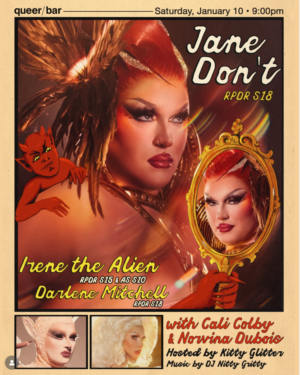


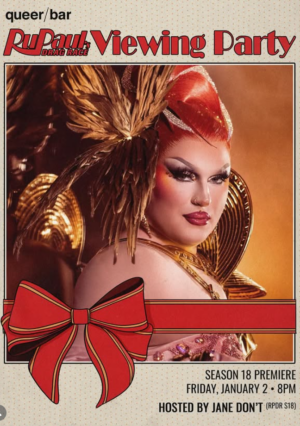

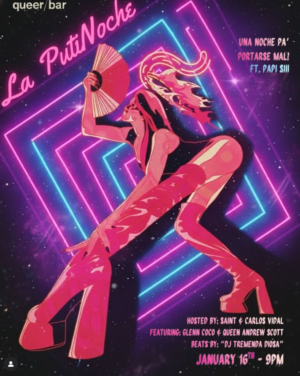


“MAME is one of the greatest plays you’ve probably never seen”
Hmmm…I might buy that statement if you’re under 40 but I think most self-respecting fags over 40 are VERY familiar with Auntie Mame!
And if they’re not, they’re immediately forced to watch the DVD of “Auntie Mame” with the incomparable Rosalind Russell…then, if they can handle it, they can attempt to watch the disastrous Lucille Ball musical version.
“I might buy that statement if you’re under 40 “
Yes 39…That explains it…:)
A couple of points.
When I said “probably never seen” I meant on stage. That is why talked about how it has not been performed much in the last 40 years.
I really should have said “one of the best musicals” not “one of the best plays” but that is just how it slipped out when I was writing.
Help!! Where did Mame go after seattle?? I failed to get my BF tickets and I’m in HOT water
Yuh oh! Mame was a local production, so it only played in Seattle.
I have done the same thing with Airline tickets and gotten in big trouble.
How about buying tickets to Hello, Dolly! instead?